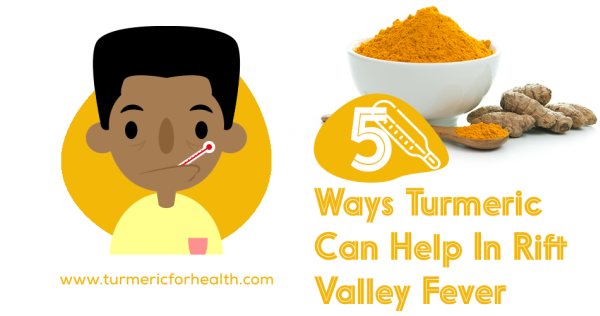Prevalence of viral infections is increasing in an unrestrained manner. Either new viral strains are identified or existing strains mutate to drug resistant forms.
This is when conventional therapy fails and scientists start looking out for new lead compounds that could terminate the infection.
The search paradigm is shifting towards plant based compounds.
Somewhere in 2012, a study revealing that turmeric can terminate Rift Valley Fever Virus hit the headlines.
At that time turmeric had not received enough attention from media, so this came as a pretty surprising news.
Anyways we decided to check if turmeric could possibly help in Rift Valley Fever in some other aspects.
What is Rift Valley Fever?
Rift Valley Fever is a viral infection that affects animals predominantly but the infection can spread to humans. The virus is carried by mosquitoes or blood feeding flies.
It can spread via contact with blood or organs of infected animals. Those who are involved in butchering, or veterinary or farming are at high risk of infection.
Humans can be infected by consumption of unpasteurized milk of infected animals or even by bites of infected mosquitoes.
Symptoms of RVF develop within 2-6 days of infection. Flu like symptoms, body ache, headache, joint pain, loss of appetite and vomiting are the preliminary symptoms. After about 7 days, the virus becomes detectable in blood.
Severe form of Rift Valley Fever can manifest as:
- Ocular form: Regular symptoms of the infection along with lesions in the eye which can lead to permanent loss of vision
- Meningoencephalitis: inflammation of the brain as well as the membrane covering the brain characterized by memory loss, confusion, headache and development of neurological complications
- Hemorrhagic form: Excessive blood loss through vomiting, stools or even as rashes on skin and impairment of liver function
There is no targeted treatment for Rift Valley Fever. Supportive therapy and non commercial vaccine is available.
Table of Contents
How can Turmeric help in Rift Valley Fever?
Turmeric’s therapeutic use in Rift Valley Fever is primarily on the grounds of its ability to terminate the infection. Also it has a number of pharmacological properties, which could be use of symptomatic treatment.
No clinical trials have been conducted to prove turmeric’s therapeutic efficacy in Rift Valley Fever but turmeric if taken appropriately is not likely to cause any side effect. Consult a health practitioner before taking turmeric supplements.
1. Curcumin prevents replication of Rift Valley Fever virus
Turmeric has been used to heal wounds and as an antiseptic in Traditional Medicine. One of the reasons for this is its superior anti-microbial property.
Turmeric exhibits anti-viral property. Its activity has been proven against multiple highly infectious viruses such as Hepatitis, HIV, HPV, etc.
Curcumin inhibits the replication of viruses, inactivates enzymes and proteins that confer infectious properties to the virus, breaks the envelope or structure that is necessary for the survival of the viral elements, etc.
The study I told you about earlier is titled as ‘Curcumin Inhibits Rift Valley Fever Virus Replication in Human Cells’. This study shows how curcumin influences certain biochemical targets in order to prevent the Rift Valley Fever Virus from replicating.
IKK (IκB kinase) is an enzyme complex that regulates the activity of Nuclear factor-kappaB (NF-Κb). NF-κB is a master protein that regulates the inflammatory process and cell cycle. In this case, IKK regulates the activity of NF-Kb in a way that it makes the conditions favorable for viral replication.
Researchers found that curcumin can inhibit the activity of IKK which in turn inhibits the replication of Rift Valley Fever Virus and also alters the life cycle of infected cells. These findings present a novel therapeutic target of modulating host cell proteins in preventing the spread of viral infection.
What does this mean?
Curcumin has anti-microbial activity and as anti-viral agent it inhibits the replication of Rift Valley Fever Virus and prevents infection from spreading throughout the body.
2. Turmeric can reduce fever and body ache occurring in RFV
Turmeric comprises of many bioactive molecules that have anti-inflammatory property. Curcumin, is now perhaps, the most famous anti-inflammatory agent. The mechanisms behind this property are:
- Inhibiting activity of nuclear factor kappa B, the protein that controls inflammation
- Reducing the activity of inflammatory chemicals like interleukins, prostaglandins
- Blocking biochemical pathways involved in inflammation
- Preventing immune cells from migrating to the site of inflammation
- Promoting the production of anti-inflammatory chemicals.

In fact for managing pain, turmeric is found to be more effective than steroid medications. (Read Why Turmeric Beats Many Steroidal Medications Hands Down, Turmeric For Various Kinds Of Pains)
Turmeric oil is found to be effective in reducing cough and sputum. Turmeric’s therapeutic properties in lung-related diseases and allergic rhinitis (cold) can be applied to treating flu. Besides Turmeric Milk is a trusted home remedy for cold and fever in Asian countries.
What does this mean?
Anti-inflammatory property of turmeric can help in treating fever, malaise, joint pain and headache occurring in Rift Valley Fever.
3. Turmeric can boost immunity and prevent fatigue
Curcumin is a potent immunomodulator- it can alter immune responses. It has immunostimulant and immunosuppressant properties.
At low doses, curcumin can stimulate immune responses and help the immune system to prepare antibodies against infection. Animal studies show that curcumin can prevent fatigue.
What does this mean?
Turmeric can boost immunity and help fight infection and alleviate fatigue.
4. Turmeric can protect against neurological symptoms of RFV
Curcumin’s anti-inflammatory, antioxidant and anti-protein aggregate activities make it a viable neuroprotective agent which is why its role has been explored in neurodegenerative diseases.
Rift Valley Fever, at late stages, can affect the brain by causing inflammation throughout the brain and meninges (the membranes covering the brain and spinal cord).
There have been no studies as such which prove that turmeric can help in this condition, but since it has strong anti-inflammatory properties turmeric should be of help.
Curcumin’s antioxidant property has been found to helpful in protecting neurons from viral infection mediated brain inflammation. A few studies report that it can protect the meninges from inflammation due to parasitic infection.
Findings of these studies should be investigated with respect to Rift Valley Fever Virus.
Neurological symptoms of Rift Valley Fever can extend to memory loss, mental fog, hallucinations, convulsions, etc. Research studies report that curcumin can reverse such cognitive defects and improve memory.
What does this mean?
Curcumin is proven to be effective in improve neurological symptoms and cognitive effects occurring in other infectious diseases and health conditions. To understand whether these could be expanded and applied to neurological symptoms of Rift Valley Fever, concrete studies are required.

Pescosolido et al have documented the use of curcumin in treating a number of eye disorders. Studies show that curcumin can help in treating uveitis, eye damage or lesions occurring in age-related macular degeneration and retinopathy (damage to the retina).
What does this mean?
Oral administration of curcumin is proven to improve symptoms of eye diseases. This could be help in protecting eyes from damage caused by Rift Valley Fever Virus.
Dosage
1 teaspoon of good quality turmeric powder (4-5g) a day is good for therapeutic purposes.
When taking turmeric powder, remember to take it with a pinch of black pepper and fats so that curcumin is well absorbed in the body. Also take the supplements immediately after a meal, for better absorption.
You can include turmeric in almost everything in your diet like smoothies, rice, soups, salads, and even desserts. We have got some great recipes right here.
There is no set dosage prescribed for Rift Valley Fever. For more details on turmeric, dosage refers to Turmeric & dosage.
If you need help with determining good quality brands supplying turmeric and turmeric supplements, do check this.
Precautions
Turmeric in food is totally safe and doses up to 8g a day have not been found to cause any side effects in clinical settings. If you are taking turmeric for the first time you might experience slight gastric discomfort.
Consult a doctor prior to taking turmeric supplements. Also, they are not advised on the long term.
Pregnant and nursing mothers should avoid turmeric supplements. Discontinue turmeric supplements two weeks prior to any surgical procedure. Avoid turmeric supplements in case of gall bladder problems.
Possible drug interactions could be with blood-thinning medicines, anti-diabetic drugs, drugs used to reduce stomach acid, etc.
A couple of studies show that turmeric can increase the risk of bleeding, which is why turmeric supplements should be avoided in the hemorrhagic form of Rift Valley Fever. Consult a doctor before taking turmeric supplements.
Conclusion
Rift Valley Fever is a viral infection which initially presents with fever but can later manifest as a neurological, eye related or hemorrhagic disorder.
Curcumin could help by inhibiting the replication of the causative virus in the first place and additionally it could serve as supportive therapy for symptomatic treatment.
However, one thing should be kept in mind that turmeric could increase the risk of bleeding, so turmeric supplements should be avoided in case of a hemorrhagic form of Rift Valley Fever.
Turmeric in the diet is not likely to pose any problems.

